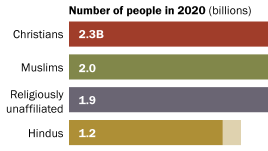
Many Religious ‘Nones’ Around the World Hold Spiritual Beliefs
Despite their nonreligious identity, many unaffiliated adults hold spiritual or religious beliefs. About a fifth or more in 22 countries believe in an afterlife, for example.
Numbers, Facts and Trends Shaping Your World
Despite their nonreligious identity, many unaffiliated adults hold spiritual or religious beliefs. About a fifth or more in 22 countries believe in an afterlife, for example.
All
Publications
Different demographic groups think differently about scientific issues. For example, those more likely to think genetically modified food is unsafe include women, African-Americans and Hispanics, and those without college degrees. Those more likely to say parents should be able to decide whether to vaccinate their children include younger adults, Republicans and independents.
Despite broadly similar views about the overall place of science in America, there are striking differences between the public and scientists’ views on a host of science-related issues.
Christians remain the largest religious group, and Muslims grew the fastest from 2010 to 2020. Read how the global share of Buddhists, Hindus, Jews and the religiously unaffiliated changed.
Most who use astrology (or a horoscope), tarot cards or a fortune teller say they do so just for fun rather than for insights about life.
After years of decline, the U.S. Christian share now shows signs of leveling off. The new Religious Landscape Study explores trends in identity, beliefs and practices.
The Global Religious Futures (GRF) project is jointly funded by The Pew Charitable Trusts and The John Templeton Foundation. Here are some big-picture findings from the GRF, together with context from other Pew Research Center studies.



